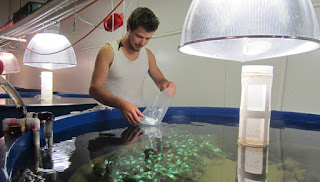Coastal marine food webs could be in danger of collapse as a result of rising carbon dioxide levels, according to our new research. The study shows that although species such as algae will receive a boost, the positive effects are likely to be cancelled out by the increased stress to species further up the food chain such as predatory fish.
 |
| A tank can give a good idea of what will happen out in the wild. |
Food webs are essentially networks of species that interact with each other. The connection between them can stabilise systems, for instance by preventing particular species from becoming too common, thereby encouraging the presence of a wide range of species.
These pathways can be quite stable, but they are vulnerable to ocean warming and acidification. Such food webs are therefore sensitive to changing climates, through potential changes both to plant growth (bottom-up effects) and to predator abundance and behaviour (top-down effects).
Because of the sheer complexity of species interactions within these food webs, we struggle to understand what future food webs might look like and how humans will be affected through changes in the services provided by the ocean, such as food, materials and energy.

No comments:
Post a Comment